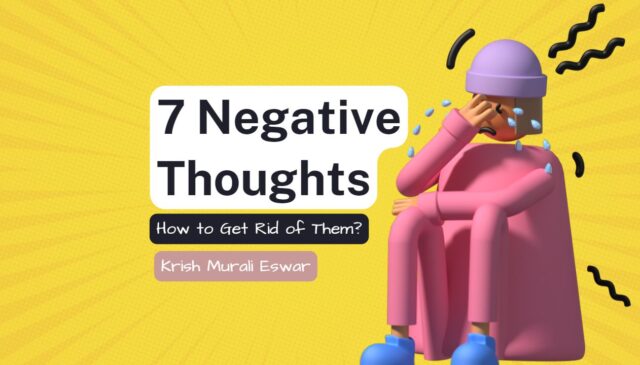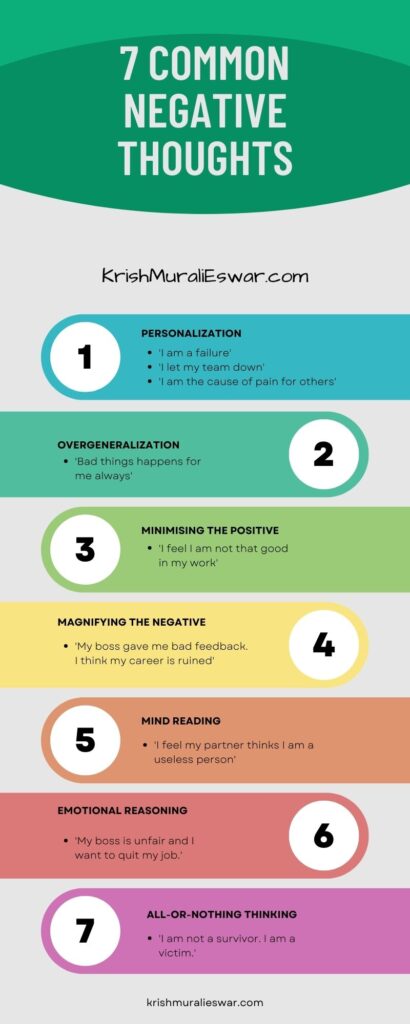

Negative thoughts are destructive, especially when they become self-fulfilling prophecies. If you think negative thoughts, you may find yourself believing those thoughts and acting upon them. This leads to feelings of depression, anxiety, anger, frustration, guilt, shame, and hopelessness.
Here are the 7 most common negative thoughts that lead to emotional pain and suffering.
1. Personalization
Negative thinking is a common problem among people. You may find yourself blaming yourself for something that happened outside of your control. Or maybe you believe that someone said something about you specifically. Either way, negative thinking can cause you to feel bad about yourself.
There are several reasons why we tend to think negatively. One reason is that our brains naturally look for patterns and try to fit events into categories. We also tend to focus on the past rather than the present and future. As a result, we end up feeling guilty or ashamed of ourselves.
A simple solution to stop negative thinking is to replace negative thoughts with positive ones. Instead of focusing on what went wrong, focus on what went right. Focus on what you did well instead of what you didn’t do well.
For example, if you were late for work, focus on what you did right. Maybe you arrived early enough to catch up on emails. Perhaps you had a great conversation with a co-worker during lunch. Whatever you did right, focus on that instead of being upset at yourself for being late.
Instead of thinking negatively, try replacing those thoughts with positive ones. Focus on what you’ve accomplished instead of what you haven’t accomplished. Focus on what you’re doing now instead of what you’re not doing.
By changing your mindset, you’ll change your life. You’ll start living a happier, healthier life.
2. Overgeneralization
We all tend to generalise from our experiences. We assume that it must happen every time if we experience something once. However, this isn’t necessarily true.
Overgeneralising can lead to making assumptions about yourself and others. For example, if you think everyone else is stupid, you might start treating people poorly. Or, if you believe that no one likes you, you might stop trying to connect with people.
Your brain makes inferences all day long. You might think you’re being logical when you come to conclusions about yourself or others. However, there’s a difference between making generalizations and overgeneralizing. Overgeneralization occurs when you assume that a rule applies to everyone, no matter what.
Overgeneralization happens when you jump to conclusions without thinking through the evidence. Instead of seeing yourself as unique, you start to view yourself as part of a group. As a result, you end up feeling bad about yourself.
Instead of assuming that rules apply to everyone, try to look at specific situations. Ask yourself questions like, “What happened?” or “Why did this happen?” Then, consider whether the case applies to you specifically.
Overgeneralization isn’t logical. But sometimes, we feel compelled to conclude ourselves or others. Try to avoid overgeneralization whenever possible.
3. Minimising the positive
Sometimes we tend to downplay our successes and exaggerate our failures. We may say things like, “That was a great speech,” or “I’m terrible at math.”
This isn’t healthy behaviour.
We tend to underestimate ourselves, especially when we achieve something significant. Even though we may feel proud of ourselves, we still tend to minimize our successes because we don’t believe they are impressive enough.
Instead of thinking negatively, try to focus on the positives. Focus on the things you did well rather than the things you didn’t do well. Think about the things that went right during your day, and remember what you accomplished.
Think positively about yourself and your accomplishments. Don’t let others tell you otherwise!
4. Magnifying the negative
A student might say, “My teacher said I have no talent and am not smart enough to succeed at college,” rather than saying, “My teacher thinks I’m talented and I’ll do great at college if I study hard!”
This kind of thinking is detrimental to success. You should try focusing on the positives and avoid dwelling on the negatives. Instead, concentrate on the positive aspects of your situation and let those positive attributes shine through.
You may feel down if you spend too much time on the negatives. However, if you keep reminding yourself of the positives, you will feel happier and more optimistic. Try to focus on the positive aspects of situations, and you will notice a difference in your mood.
5. Mind reading
Sometimes we assume that we know what another person is thinking or feeling without asking them directly. We call this mind reading. Mind reading is a common habit that most of us engage in at least once every day.
For example, if you were talking to a friend about your new job, you might think that she was thinking about how boring it must be to work there. However, she may not have said anything to indicate that she felt that. You assumed she didn’t like working there, but she never told you.
You probably did this kind of mind-reading hundreds of times. Most of the time, you weren’t aware that you had done it. But sometimes, you realize that you made a mistake after the fact.
This is called hindsight bias. It happens when we remember our past experiences differently than how they happened. In this case, you remembered that your friend seemed upset with you, but she didn’t say anything to indicate that she felt that way.
Hindsight bias is a prevalent cognitive error. People tend to believe they knew what was happening in the past, even though they didn’t. As a result, they feel confident in making predictions.
However, it turns out that we don’t usually predict accurately. Our guesses are often wrong because we fail to consider all the possible outcomes.
We do this by focusing only on the outcome that we expect to happen. We ignore any alternative possibilities.
To avoid making mistakes, try to keep an open mind. Don’t jump to conclusions about what other people are thinking or feeling. Instead, ask them directly. Ask questions like, “What are you thinking?” or “Are you mad at me right now?”
6. Emotional reasoning
Emotional reasoning is a common mental fallacy when we assume that our feelings are evidence of reality. We believe that something must be wrong with us if we feel bad. However, emotions tell us whether something is right or wrong. Emotions are not facts, so we should never base decisions on them.
For example, let’s say you feel angry at your boss. You might think he is unfair and decide to quit your job. But it would be best if you didn’t base your decision on your anger. Instead, you should look at the situation objectively and determine whether quitting makes sense.
You can also apply this logic to situations where you feel depressed or anxious. These feelings tell you something isn’t working, but they aren’t necessarily accurate representations of reality. So, instead of assuming you are defective, try to figure out what’s causing your depression or anxiety. Once you find the cause, you’ll be able to change your mood and start feeling happier.
7. All-or-nothing thinking
All-or-nothing thinking means that we only see things in extremes. We tend to view others as either completely good or downright evil. There’s no middle ground.
For example, if someone says something rude to us, we might feel angry at them. But if they apologize, we may still feel upset because we didn’t expect them to say sorry. We might not realize that they were trying to be nice.
We also tend to think that our lives are either great or terrible. We believe that everything is either good or bad. We don’t see anything in between.
This kind of thinking makes it difficult to accept the reality of life. Instead, we focus on the worst possible outcome. We become fearful of the future because we fear that things will never change.
You can overcome all-or-nothing thinking by recognising it and changing your perspective. You’ll find that you can handle most situations better if you try to look at things from another angle.
For example, instead of seeing yourself as a victim, you can start to see yourself as a survivor. Instead of viewing others as enemies, you can begin to view them as allies. Instead of believing that your life is either wonderful or horrible, you can learn to appreciate the good times and accept the bad ones as passing phases of life.
Recognizing all-or-nothing thoughts and changing your perspective can improve your outlook on life.
How to overcome negative thinking
- Meditate in Sahasrara (Thuriya, Crown Chakra) on your Kundalini for 20 minutes.
- Enter the Alpha state of the mental frequency.
- Remain in silence.
- Take a notebook or diary and a pen.
- Write down your negative thoughts.
- Identify the patterns.
- Identify the root cause. (Is it Need, Habit, Other’s imposition, Environmental condition, Genetic, or Divinity?)
- Write down how the thoughts will affect you and others, mentally and physically, at present and in the future.
- Find positive thoughts to superimpose the negative ones. Write them down as clearly as possible.
- Meditate and enter the Alpha state of mind.
- Visualize and superimpose negative thoughts with positive thoughts.
Conclusion
Unhelpful thoughts are just that—unhelpful. They do not provide any benefit to us and only cause harm. We should try our best to avoid them and replace them with healthy thoughts.
If we find ourselves having unhelpful thoughts, we should ask ourselves why we have them. Is it because we were exposed to certain situations at a young age? Or did we receive messages from others that made us believe we were less worthy than others? Maybe we had a traumatic event happen to us, or perhaps we felt insecure about ourselves. These experiences left us feeling vulnerable and anxious.
We should remember that we are not alone. Many people suffer from similar problems. By talking to someone we trust, we can gain insight into our lives and work towards changing our habits.
Once we have identified the source of our unhelpful thoughts, we must change our mindsets. We must become aware of our thoughts and realise they are not necessarily true. Instead, we should focus on our truth and reality.
By understanding our thoughts and learning to manage them, we can live happier and healthier lives.
Head over to a Vethathiri SKY Yoga Centre. Awaken your kundalini. Get started meditating right away. Introspect. Build positive thinking.
Are you a meditator? Share your experience of building positive thinking in the comments below.
Be Blessed by the Divine!
Krish Murali Eswar.
Leave a Reply